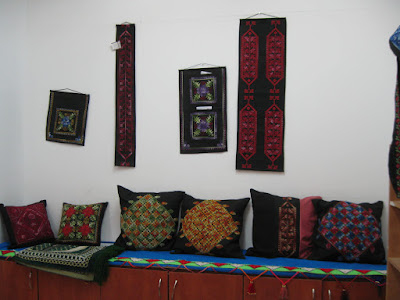Today is World Fair Trade Day!
And what better example of fair trade than Desert Embroidery, the Association for the Improvement of Women's Status, begun by the women in the Bedouin town Lakia.
The women in the association do fine traditional embroidery by hand.
Each works in her home and then brings her creations to the center to be finished into products that are sold in their shop.
To quote their website:
In the 1980's, a group of Bedouin girls got together to improve life in their village. In 1996 the Association for the Improvement of Women's Status achieved official recognition as the first Bedouin women's non-profit organization in Southern Israel.
Today we run a successful embroidery program to generate income for Bedouin women and preserve traditional handicrafts. We operate a mobile library serving over 1,500 children, as well as educational programs for women and youth. We invite you to visit the Desert Embroidery Visitor Center or browse the fine handmade embroidery products we offer.
The colors and patterns handed down over the generations tell a unique story, depending on how they are blended; that is why each young Bedouin woman embroiders a dress of her own to tell her own life story.
Please take a look at the website which explains what the brave women of Lakia have accomplished.
Your heart will swell.
.
UPDATE: This paragraph tells fascinating things about the symbolism of Bedouin embroidery!
.
(Linking to Our World Tuesday.)
.






Some beautiful patterns in their work.
ReplyDeleteMasterpiece of women
ReplyDeleteGreat
ReplyDelete
ReplyDeleteThe Bedouin live in a very hot, dry climate. Yet all the textiles are black. So although the black makes the patterns stand out beautifully, I would have thought that black absorbs the heat.
Hels, yes, we would think that, but there is some scientific evidence to the contrary, like here in the journal Nature:
ReplyDeletehttp://www.nature.com/nature/journal/v283/n5745/abs/283373a0.html
I imagine that in the past, the color "choice" was limited by available materials. Bedouin always had black goats. Hence the woven black tents they had when still largely nomadic.
These days, the Bedouin men that I see in Beer Sheva are wearing all white, not black. And it's only the older men who will come to the city in traditional clothing. The women that I see are in plain black from head to toe, some even with the face covered.
I added this to the post now. Fascinating about the symbolism of the embroidery:
https://books.google.co.il/books?id=N4IiFwzq1SAC&pg=PA14&lpg=PA14&dq=traditional+bedouin+embroidery&source=bl&ots=AKqZys3jYl&sig=CuUk14mjawyEGBtl_fpWajtVUEw&hl=en&sa=X&ved=0ahUKEwjqlbObyeDMAhUBwBQKHe0EBaEQ6AEIZDAQ#v=onepage&
q=traditional%20bedouin%20embroidery&f=false
This is also most interesting about what the embroidery tells about the women (although it is about Palestinian and not Bedouin costumes):
https://en.wikipedia.org/wiki/Palestinian_costumes
wonderful hand crafts.
ReplyDeleteThe needle work is beautiful Dina
ReplyDeleteThank you for sharing this Dina. I had never seen traditional Bedouin embroidery, although I'm a keen needleworker myself. I also like to support Fairtrade. The stitchery is beautiful and the designs are very striking.
ReplyDeleteWow! They certainly do beautiful work!
ReplyDelete